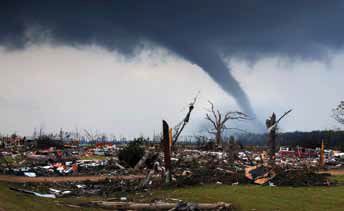Find fellowships, conferences, grants and awards deadlines, workshops and networking opportunities, crowd-sourced leads to job banks, reporting toolkits, hundreds of MOOCs and more. GO >>
Here are essential resources prepared for the SEJ workshop, September 3, 2014, in New Orleans on
"Disasters and Extreme Weather: Gathering the News, Keeping Safe"
[EDITOR'S NOTE: Links were checked (and updated where possible) on August 25, 2017.]
 Government
Government
CDC risk communication guidelines.
CDC Bioterrorism and chemical emergencies information.
CDC: Crisis & Emergency Risk Communication.
DOT Emergency Response Guidebook. The 2016 guidebook gives chemical identification placard information, advice on chemical properties, and guidelines for emergency action.
- YouTube training in use of 2016 DOT Guidebook and approaching disaster scenes.
- DOT 2016 Guidebook mobile app.
Earthquakes: USGS Earthquake Hazards program.
EPA List of Lists: Consolidated List of Chemicals Subject to the Emergency Planning and Community Right-To-Know Act (EPCRA), Comprehensive Environmental Response, Compensation and Liability Act (CERCLA) and Section 112(r) of the Clean Air Act.
National Academy of Sciences: Publications about oil spills.
NIH: Toxicology Data Network (TOXNET).
NOAA - National Weather Service. Media contacts.
- Storm research, tornado background, etc.: Keli Pirtle, 405-325-6933, keli.pirtle.noaa.gov
- Oil and Chemical Spills Disaster Response Center.
- Interactive map for weather threats. Threats (risk of tornadoes, fire, flooding, etc.) are color-coded, so you can readily tell what’s happening where. Changes continuously so it’s a quick way to monitor tornado outbreaks. Click on the map for localized information.
NOAA - Nationwide forecasting / Storm Prediction Center. This is for big, inland storm systems. Use the 'Conv. outlook' link
- Real-time storm damage map (tornadoes, hail and wind). Relatively real-time storm reports, a list, chronologically, of where big hail, strong winds and tornadoes have occurred, the type of damage and any injuries or deaths. Times are sometimes listed in Universal Time, so don’t get tricked by that. Keep in mind that these are REPORTS made to the weather service, not always verified.
NOAA - River level/flooding forecasts.
- Current and historic stream levels, with flood details (USGS).
- What was precipitation pattern?
- What’s snow cover like?
Nuclear Regulatory Commission (NRC): Contacts.
- NRC guide "Effective Risk Communication."
TRI (Toxics Release Inventory): A local inventory of toxic chemicals mandated by the Emergency Planning and Community Right to Know Act of 1986 (EPCRA) and the Pollution Prevention Act of 1990.
Toxmap: Searchable TRI and superfund map.
Wildfires: National Interagency Fire Center (NIFC).
Non- Governmental Organizations
American Planning Association disaster recovery blog.
Dart Center for Journalism and Trauma, a project of the Columbia University Graduate School of Journalism, educates journalists about the science and psychology of trauma and the implications for news coverage.
Gulf of Mexico Research Initiative (GOMRI): Investigating the effect of oil spills on the environment and public health.
International Center for Journalists - Disaster and Crisis Coverage.
International News Safety Institute: Covering natural disasters.
Investigative Reporters and Editors: Hurricane Sandy - Covering the Aftermath.
LUMCON (Louisiana Universities Marine Consortium): Effects of offshore oil and gas development - A current awareness bibliography.
LUMCON: Dispersants bibliography.
National Center for Disaster Preparedness.
News Lab: Tips for covering disasters and staying safe.
Nuclear Energy Institute is the policy organization of the nuclear energy and technologies industry.
University of Missouri School of Journalism: Disaster Reporting resources.
University of Colorado at Boulder, Natural Hazards Center.
Verification Handbook: A definitive guide to verifying digital content for emergency coverage.
Articles & Tipsheets
"Covering A Hurricane: What you need to know" handout with checklist, developed by the Charlotte Observer, courtesy of Scott Dodd and Chrysti Shain.
“It’s a disaster,” NICAR tipsheet, Matt Jacob/Dallas Morning News and Alex Richards/Chicago Tribune.
Boing Boing Gadgets Podcast 013: Journalist Quinn Norton on what she carries in her backpack when covering civil unrest, such as Occupy Wall Street or the protests and police actions in Ferguson, Missouri. With the possible exception of the swim goggles and dust mask (for protecting oneself from teargas), it's all good advice for covering disasters as well. Find it on iTunes, Soundcloud or here.
"Packing for a Protest: The Gear Journalists Take to Report in Conflict Areas" - Storify.
Hurricane coverage advice from a veteran New Orleans journalist (Jane Boulen).
"Covering Sandy: Tips from Experts."
Have suggestions for additions to this page? Contact SEJ web content manager Cindy MacDonald.
See also: Disaster content on SEJ.org.
















